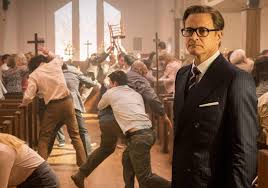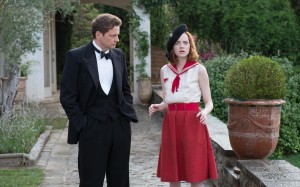THE PAST AIN’T WHAT IT USE TO BE: Movie Reviews of Genius and Finding Dory by Howard Casner
Posted: June 23, 2016 | Author: Donald | Filed under: Uncategorized | Tags: Colin Firth, Dominic West, Ernest Hemingway, Finding Dory, Finding Nemo, Genius, Guy Pearce, John Logan, Jude Law, Laura Linney, Max Perkins, Michael Grandrage, Nicole Kidman, Thomas Wolfe | 6 Comments »First, a word from our sponsors: I wanted to say thank you to everyone who contributed to our Indiegogo campaign for 15 Conversations in 10 Minutes. We did very well due to you folks. For those who weren’t able to give, keep us in your thoughts. And if you are able to contribute in the future, contact me and I’ll tell you how. I will even honor the perks on the original campaign.
I am now offering a new consultation service: so much emphasis has been given lately to the importance of the opening of your screenplay, I now offer coverage for the first twenty pages at the cost of $20.00. For those who don’t want to have full coverage on their screenplay at this time, but want to know how well their script is working with the opening pages, this is perfect for you. I’ll help you not lose the reader on page one.
Ever wonder what a reader for a contest or agency thinks when he reads your screenplay? Check out my new e-book published on Amazon: Rantings and Ravings of a Screenplay Reader, including my series of essays, What I Learned Reading for Contests This Year, and my film reviews of 2013. Only $2.99. http://ow.ly/xN31r
and check out my Script Consultation Services: http://ow.ly/HPxKE
Warning: SPOILERS
 Two movies have opened that deal with the past in some way. One takes place in it, and one has a character trying to find it.
Two movies have opened that deal with the past in some way. One takes place in it, and one has a character trying to find it.
Genius is the based on a true story film about the editor Max Perkins (Colin Firth) and his nurturing of the somewhat difficult, to say the least, writer Thomas Wolfe (Jude Law) and the publication of Wolfe’s two books, Look Homeward, Angel and Of Time and the River.
It was certainly a tumultuous relationship as artist/mentor relationships go. Perkins, though responsible for the publishing of such authors as Hemingway and Fitzgerald, was a Puritan at heart. Wolfe was larger than life, obnoxious, rude, an egotist and near sociopath, who lived life as if it were a last meal to be devoured.
One might very well ask, then, how a drama revolving around two such men could be, well, if truth be told and the devil shamed, tedious and almost never gripping? Read the rest of this entry »
KING, QUEEN AND PAWNS: Movie reviews of Kingsman: The Secret Service, Song of the Sea and Timbuktu by Howard Casner
Posted: February 18, 2015 | Author: Donald | Filed under: Uncategorized | Tags: Abderrahmane Sissako, Abel Jefri, Brendon Gleeson, Colin Firth, Dave Gibbons, David Rawle, Fionnula Flannagan, Jane Goldman, Kessen Tall, Kingsman: The Secret Service, Mark Hamill, Mark Millar, Mark Strong, Matthew Vaughn, Michael Caine, Samuel L. Jackson, Sofia Boutella, Song of the Sea, Taron Egerton, Timbuktu, Tomm Moore, Will Collins | 1,046 Comments »First, a word from our sponsors. Ever wonder what a reader for a contest or agency thinks when he reads your screenplay? Check out my new e-book published on Amazon: Rantings and Ravings of a Screenplay Reader, including my series of essays, What I Learned Reading for Contests This Year, and my film reviews of 2013. Only $2.99. http://ow.ly/xN31r
and check out my Script Consultation Services: http://ow.ly/HPxKE
Warning: SPOILERS
 Kingsman: The Secret Service, the latest entry in a comic book franchise, this one with an espionage theme, is, in many ways, an impressive and handsomely made movie.
Kingsman: The Secret Service, the latest entry in a comic book franchise, this one with an espionage theme, is, in many ways, an impressive and handsomely made movie.
From a technical perspective, it’s incredibly well done with the best costumes, sets, and music money can buy. It doesn’t stint and there is nothing in this film that is an old piece of tat or is cheap as chips.
The acting is also first rate, raiding the cupboards as it does for the actors who are left who managed to not appear in The Lord of the Rings or The Harry Potter series.
And it has some beautifully well staged and directed second unit scenes of carefully, even wittily, choreographed episodes of extreme violence.
In many ways, those who like these sort of studio type tent pole films will probably find it hard to carp at anything they see.
So why did I find the whole thing dispiriting and extremely depressing?
NOTHING UP HIS SLEEVE: Movie review of Woody Allen’s film Magic in the Moonlight by Howard Casner
Posted: August 25, 2014 | Author: Donald | Filed under: Uncategorized | Tags: Colin Firth, Eillen Atkins, Emma Stone, Hamlish Linklater, Howard Burkan, Jackie Weaver, Magic in the Moonlight, Marcia Gay Harden, Ute Lemper, Woody Allen | 3,238 Comments »First, a word from our sponsors. Ever wonder what a reader for a contest or agency thinks when he reads your screenplay? Check out my new e-book published on Amazon: Rantings and Ravings of a Screenplay Reader, including my series of essays, What I Learned Reading for Contests This Year, and my film reviews of 2013. Only $2.99. http://ow.ly/xN31r
Warning: SPOILERS
 Woody Allen, almost a national treasure now as far as I’m concerned, has always been something of a clever parodist.
Woody Allen, almost a national treasure now as far as I’m concerned, has always been something of a clever parodist.
He can imitate anything, both seriously and satirically, from Bergman (Love & Death, Interiors and Husbands and Wives amongst a ton of others) to Fellini (Stardust Memories) to Kafka and Bertolt Brecht (Shadows and Fog) to documentaries (Take the Money and Run and Zelig) to almost anything else.
Now we have a new set of authors that Allen has mined for a movie. His latest foray into cinematic creativity, Magic in the Moonlight, a story about a magician trying to prove that a psychic is a fraud in the 1920’s south of France, is basically Noel Coward and Somerset Maughm with a lead character that is straight out of Shaw’s Pygmalion as if written by Nietzsche. Read the rest of this entry »
Movie Review of DISCONNECT, ARTHUR NEWMAN and THE ICEMAN by Howard Casner
Posted: May 8, 2013 | Author: Donald | Filed under: Uncategorized | Tags: Alexander Skarsgard, Andrew Stern, Ariel Vromen, Arthur Newman, Becky Johnston, Chris Evans, Colin Firth, Dante Ariola, David Schwimmer, Disconnect, Emily Blunt, Henry Alex Rubin, Hope Davis, Jason Bateman, Michael Nyqvist, Michael Shannon, Morgan Land, Ray Liotta, The Iceman, Winona Ryder | 3,465 Comments »Disconnect, the new techno-thriller from writer Andrew Stern and director Henry Alex Rubin, spends half its time preaching the horrors of modern computer technology and all the evils it can spawn, and then seems to change its mind and spend the other half telling us how that very same technology (and the evil it spawns) can bring estranged people together and save our souls by revealing who we really are. One might think that the filmmakers were going for irony, but I have to be honest and say I think irony was the last thing in play here. For me, the driving force of the film was pandering to the audience with filmmakers taking a typical middlebrow approach to art: confront the audience with something important and even horrendous, but only to the degree that it doesn’t upset them too much and affect the box office.
Disconnect has several through lines in which people are linked in a sort of La Ronde relationship—one person in one story is connected in some way to a person in another. It never comes full circle, so it doesn’t quite fit the structure of Schnitzler’s legendary opus, but it is the cleverest aspect of the film and perhaps the only satisfactory irony to be found: we’re all disconnected due to the internet, yet we end up being even more connected than we thought.
The movie is ambitious and sincere, but never quite has the emotional impact it is aiming for. One reason for this is that for a thriller, Stern and Rubin aren’t able to really generate that many, well, thrills. There’s a lot of conflict, but precious little tension and it seems to take its time going anywhere. There could be several reasons for this. None of the various stories are all that original and their plot lines have few surprises; every turn is signaled well before it happens and the resolutions are rather ho-hum with a touch of LOL along for the ride (they all climax in a set of slow motion, Matrix like intercut sequences that were probably suppose to emphasize the tragedy of it all, but instead only doubled the over the top feeling that was already there).
In addition, each through line has enough going for it to be a whole movie unto itself; but by squeezing each plotline into the length of basically a half hour TV episode, it tended to also squeeze out all the suspense (I couldn’t help but think of what Alfred Hitchcock or Claude Chabrol could have done with just one of the stories). Finally, the whole thing just felt a bit too manipulated, never quite real, with characters that seemed more driven by the plot than the plot being driven by the characters; the result is that the more empathy the filmmakers tried to create for their characters, the less there was.
The acting is solid, but save for a couple of exceptions (Alexander Skarsgard as a victim of identity theft and Michael Nyqvist as someone who may or may not have stolen that identity), no one really rises above the limitations of the screenplay. Hope Davis is wasted in a minor role (and for some reason is given the thankless and perplexing task of not understanding why her husband, played by Jason Bateman, might actually want to find out why his son tried to kill himself). Everyone seems to wear their emotions on their sleeves. Subtle is not a word that might be used to describe the film.
In Sam Shepard’s great play The Curse of the Starving Class, there is a conversation that goes something like this: one character wants to move in order to get away from their present environment, but another character responds by saying, “…but we’ll still be the same people”. I couldn’t help but think of this when I saw Arthur Newman, a film about a man who creates a new identity for himself (yes, Virginia, Arthur’s last name is not the most subtle of choices here).
Colin Firth plays the title character, a Babbit in a grey, flannel suit (well, since he works for Fed Ex, brown khaki pants, but you get my drift). Arthur is a rather boring character, to be both blunt and kind. And when he’s fired from his place of employment, he decides to reboot his life. Unfortunately for him, and the audience, the new Arthur is as boring and uninteresting as his previous incarnation. To make matters worse, Firth uses a bland American accent that’s even more tedious than his personality.
Things pick up a bit when he meets Emily Blunt (as things are wont to do when one meets Emily Blunt), who plays a character who has identity issues of her own, issues compounded by a game she talks Arthur into playing in which they break into people’s homes, wear their victims’ clothes, eat their victims’ food, drink their wine and have sex in their beds.
In the end, screenwriter Becky Johnston and director Dante Ariola show great empathy for their characters, but the movie never really comes together. I suspect that this is because there are so many through lines going on (Arthur wanting to be a golf pro; Blunt’s issues; their sex games; Arthur’s failed relationship with his son), that the filmmakers can’t seem to find a way to weave them all together in a satisfactory whole.
The Iceman, the new crime drama by writers Ariel Vromen (who also directed) and Morgan Land, is a movie where Ray Liotta finally meets someone even more psychopathic than he is and where Winona Ryder, David Schwimmer and Chris Evans try to earn street cred by playing against type (for the record, Evans comes out best). There’s nothing really wrong with the movie. It gets the job done and I was never bored. Michael Shannon does very well in the title role. But in the end, it doesn’t come close to plumbing the existential depths of the television series Dexter and falls into the “if you’ve seen one contract killer movie, you’ve seen them all”.
Tell me what you think.











